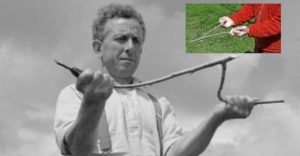What appears to be a common branch has a hidden purpose that has intrigued generations. Known by various names such as fortune teller, squiggle, witch’s well, or water finder, this tool was used for an age-old practice called dowsing.
Dowsing, often considered an old wives’ tale, involves a Y-shaped branch held by an individual. With the palms facing upward and the lower part of the branch tilted at a 45-degree angle to the earth, the dowser moves back and forth. The belief is that the vibrations at the bottom of the Y indicate the presence of water underground.
Originally used in the 16th century to find metals in the ground, dowsing evolved into a technique for locating water sources. The prospect of drilling in the wrong place and incurring high expenses prompted the use of this method, offering an economical and efficient solution for finding water in rural areas.
Although advancements in technology have debunked the myth of water being scarce beneath the Earth’s surface, the tool itself remains a testament to historical ingenuity. In fact, some drilling companies still employ water dowsing as a preliminary step before drilling to ensure a water source.
So, if you’ve deciphered the purpose of this ancient tool, kudos to you! Share this fascinating insight with your friends and let us know if they can guess its intriguing history.
